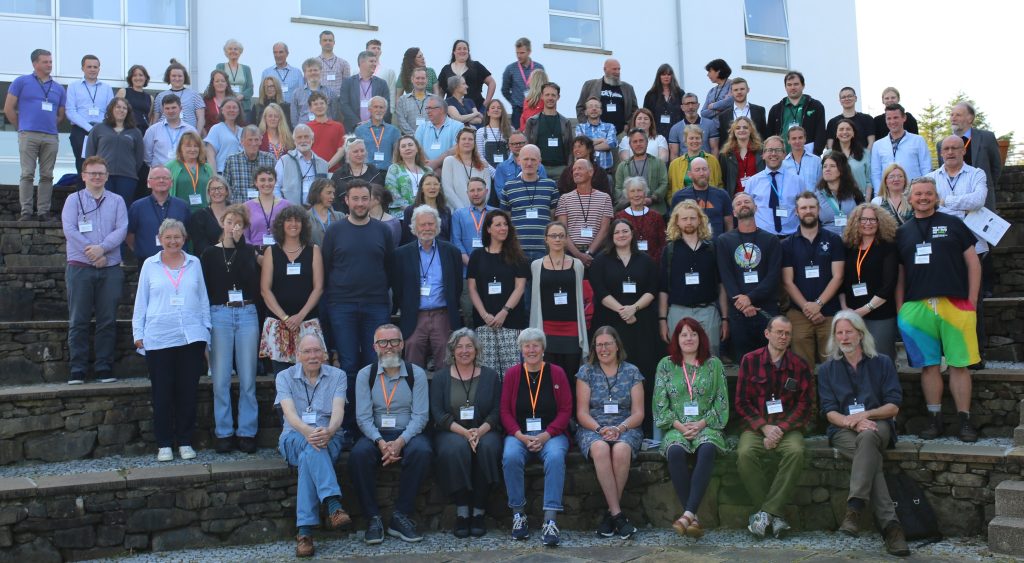Community landowners support ambitious land reform and nature restoration
12 June 2023
We held our 12th annual conference ‘Community Ownership and Land Reform: Marking the Centenary, Shaping the Future’ at Sabhal Mòr Ostaig Skye on the 2nd and 3rd June. The conference, which had been fully booked for weeks, saw 100 delegates gather together to discuss land reform and community ownership and begin the celebrations of the centenary of the first community buyout to be completed.
Ailsa Raeburn, Chair of Community Land Scotland says “this conference gave us the opportunity to look back 100 years but also to look forward. Community landownership has shown itself to be a transformational model for many communities but those looking to buy estates are being priced out of an overheated land market. If we want the benefits of landownership to be shared more equitably, we need to be bold about asking for ambitious land reform.”

The Land Reform Bill was understandably a key topic at the conference, as concerns over rapidly increasing land prices and further land ownership concentration – as highlighted in the Scottish Land Commission’s report – sharpened delegates desire for ambitious and robust land reform. During discussions and priority setting sessions delegates providing clear support for our proposals for:
- A Public Interest Test on sales of landholdings of significance in both urban and rural communities
- Placing the Land Rights and Responsibility Statement on a statutory footing with a Public Interest Test on any landholdings not meeting the requirements of the Statement
- A Public Interest Test on sales of landholdings of significance in both urban and rural communities
- Prior notification of sale on identified land and assets for communities
- A total cap on land landownership by an individual or linked companies
- Removing the £1 million notional threshold on the Scottish Land Fund – instead allowing decisions on a case-by-case basis
- Securing amendments to Community Right to Buy legislation – to make it easier to communities to register their interest in land and therefore be able to trigger a Community Right to Buy
Attendees also listened to Three Bold Ideas for Change as Kate Wimpress of North Edinburgh Arts talked about putting communities in the driving seat in relation to development; Mercedes Villalba MSP pitched the idea that there should be a cap on the total amount of land an individual or corporation can own and Megan MacInnes from the Scottish Land Commission asked whether Scotland’s land should be used to build community wealth. Delegates were overwhelmingly supportive of a total cap on landownership and for land to be used primarily for delivering community wealth building as well as seeing community ownership and empowerment as a key means of fighting poverty.
Community-led biodiversity was the second key topic of the conference, as the biodiversity crisis rises up communities’ agendas. Representatives from the North Harris Trust, Urras Oighreachd Chàrlabhaigh/ Carloway Estate Trust, John Muir Trust and Viewpark Conservation Group in Lanarkshire shared their learning on how communities can lead the way on ecological restoration. Delegates reflected on how community-led ecological regeneration was not only essential but the right thing to do, with many community landowners undertaking ecological projects to improve their local ecosystems but without taking part in the financial incentives provided by the carbon markets, due to scepticism of the natural capital market. Our members demonstrated how the most successful biodiversity and climate projects are community-led and deliver outcomes not just for the environment but for local people too.


Addressing inequality and securing the long-term viability of fragile rural and urban communities also emerged as a key theme, with sessions on housing and repopulation; community renewable energy and engaging young people in community ownership very well attended. Case studies from Huntly Development Trust, Coigach Community Development Company and WATIF demonstrated how community ownership of land underpinned the creation of vibrant, local wellbeing economies which retained wealth in the local area and supported the reinvigoration of the population.
Josh Doble, Policy Manager with Community Land Scotland said “The conference demonstrated the strong mandate Community Land Scotland has for pursuing an ambitious Land Reform Bill. Further community landownership will help address the key challenges facing Scotland by underpinning the creation of resilient, circular, sustainable local economies and cultures which will help create more housing and jobs, retain and grow local populations while also helping Scotland’s ecosystems recover. Local communities want to protect, enhance and expand the green and blue spaces around them and ensure they live in an environment in which their families and communities can thrive. Concentrated land ownership has resulted in Scotland having some of the most degraded land in Europe, whereas our members are leading the way in renewable energy and ecological restoration. The long-term solutions to the nature crises, cost of living crisis, growing inequality and political, economic and cultural alienation are for us to think locally by empowering communities around Scotland in order to address the global challenges we face.”
Information:
Dr Josh Doble, Policy Manager
- josh.doble@communitylandscotland.org.uk
- 07940 993 555
